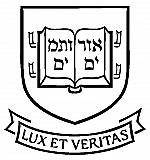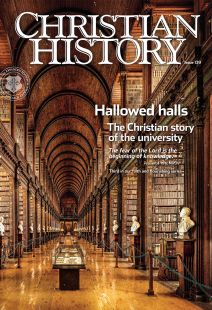Humility, truth, mentoring, love

[ABOVE—Vatican Mosaic, Theology with Divinitiy and Insight—Darafsh / [CC BY-SA 3.0] Wikimedia]
We talked to four educators about their visions for the common good as practiced by Christians in higher education today, asking them two questions: how would you define human flourishing in the context of higher education, and, if you had the power to do so, how would you modify higher education as it currently stands to bring greater flourishing?
• Craig A. Boyd is professor of philosophy and humanities at Saint Louis University and author of numerous books on ethics and moral philosophy.
Craig A. Boyd: Flourishing is always a communal project. You can’t flourish on your own; you can only do so with the support of a community that shares
your understanding and commitment to the common good. We are always dependent upon the grace and compassion and goodness of other people. We’re fragile and we’re not really autonomous.
This flies in the face of much of political thought that shapes North American ideas of who we are—a self-sufficient political individualism from John Locke, in reaction to the communal approach of medieval figures like Aquinas and Bonaventure and Augustine. This idea of autonomous individualism denies our creatureliness and dependency on others. It gives us a false sense of our value being based on autonomy. To be in a community, it’s critical that you practice humility. Aquinas says it’s the precursor to all the other virtues because it clears away the rubble upon which you need to build the foundation of faith, hope, and love.
Christian higher education, like much of higher education today, focuses more on technique and less on virtue; but virtues help sustain the community and help us persevere. We treat virtues as a value-added aspect. But they should be central. Forgiveness, repentance, and humility are important things intellectually. Intellectual virtues and skills should all be practiced within the greater context of moral virtues. Of course you don’t have to go to college or university to develop moral virtues, and there are also vices that are particularly unique to intellectuals—excessive curiosity, pride.
It’s difficult to develop virtues at the university unless you have communities within it. At Saint Louis we have a Catholic studies program where we have Jesuit priests who are solid people trying to inculcate this. It’s hard to have a community of 10,000 people. For 10,000 people, you need laws. Aquinas says laws are there to prevent the worst kinds of evils. But laws don’t say anything about our inward dispositions.
If money and time and accrediting agencies were not in play, I would build in an ethics element to contemporary education. Not just because I’m an ethicist; you need moral continuity going throughout the entire curriculum, not bouncing around from course to course with different colleagues and instructors. I think you would want to have cohorts, working together throughout their four years, meeting together with a guide, thinking about developing virtues in community.
• Drew Trotter is former executive director of the Consortium of Christian Study Centers and has written on film and popular culture as well as publishing a commentary on Hebrews.
Drew Trotter: Human flourishing in a higher education context first has to involve a rigorous life of the mind. I have a strong affinity with the notion of a university being a place where knowledge is communicated. But human flourishing in a university context also needs to have a deep kind of heart component.
That has to do with my theory of knowledge: you don’t really know something unless it’s personal knowledge. You can’t just memorize the eight components to Anselm’s argument for the existence of God and spew them back on a test, and feel like you’ve learned something.
The interaction back and forth between a so-called teacher and a so-called student—I’ve actually learned a lot from my students—is often a restricted relationship. Teachers restrict office hours. They don’t have students in their homes. They don’t engage with them in class.
And that really doesn’t cause flourishing to happen, because when flourishing happens, it’s when a student has so engaged with the material that they can ask questions and have opinions about it; it grabs hold of them so much that they want to talk about it in the hallways and in the evenings. Some students are like that now, but they are few and far between. The university’s responsibility is to try to help all students to become like that.
To think of knowledge as existing for the good of society, the good of others, is also a part of human flourishing. Again the university is bad about this, implying that the student is king: “We are here for you. You need to grow. You need to learn. You need to. . . .” This teaches the student me, me, me, me, me and doesn’t ever get them into a world of sharing and loving others.
If universities now were as they were originally, they would have no problem with understanding that we need to ask: How does this glorify God? How does it praise God? How does it make us give thanks to God? How does it help us to think about what God might be doing in the world? For obvious reasons, secular universities do not ask those questions at all. In fact they reject their usefulness, sometimes even their legality.
If I could design my perfect university, it would be Cambridge staffed by a wonderful group of sanctified Christians. I like the system Cambridge uses. Lectures are not part of the grading system. You choose which lectures you attend, even across disciplines. You meet with your tutor and write on subjects the tutor asks you to write about. Being eloquent is a by-product of having to think things through by writing them down. If there’s something the university’s supposed to do besides give you a huge database of facts for the future, it is to teach you how to manage that database of facts well to make new things for the good of society.
I would have a student-faculty ratio of ten to one. And I would spend a lot of money to elevate in the eyes of society the teaching role and make it much more what it used to be. Far too many professors don’t think of themselves as people who are building other human beings. They think of themselves as communicators of information for as little time as they can spare so that they can get back to their research.
• Luke Bobo is director of strategic partnerships for Made to Flourish with a background in engineering and was executive director of the Francis Schaeffer Institute at Covenant Seminary, where he now serves as visiting professor.
Luke Bobo: My definition of human flourishing would be very simply “self-shalom”: a progression toward personal wholeness. The Fall caused disintegration. Human flourishing is taking progressive steps toward wholeness physically, emotionally, economically, mentally, spiritually, and existentially.
I’m interested in what actually begins before a student steps foot on the campus. I want to partner with churches in making sure that a student should actually attend higher ed, because I think too often young people follow the American Christian script: graduate from high school, go to college, get married, graduate, get a house in the suburbs with a white picket fence, get a dog named Spot, have two-and-a-half kids. I used to tell my students that some of you have been sold a bag of goods; some of you should not be in college. Some of you are quite capable of working in the trades. Some of you are wasting someone’s money.
If I would make one modification to Christian higher ed, it would be to focus on practical theology. We graduate too many people from Christian schools with big heads and small hearts. We need a semester in class and then a semester in the field—a workplace situation, or working in the ‘hood or the ghetto or an urban context, or a church in a suburban context.
I’d encourage students to pursue, as James K. A. Smith talks about in his book You Are What You Love, “being” over “doing” (ontological over functional). That will put things in better perspective; they will understand that their primary vocation is to be good students. I’d encourage Christian teachers to be content experts and do that well, but I want them to lead first with compassion because every student has a story.
My ethics professor said God has designed three institutions for the sake of human flourishing: the church, civil government, and the family. I would add a fourth, the workplace. Teachers have the responsibility of creating a classroom environment conducive to human flourishing in all of these areas. That means treating students with dignity and respect.
This reminds me of a sister on Twitter. One of her students was consistent in attendance, then suddenly began missing classes, coming late, being lethargic. She finally sat down and asked the student, “What’s wrong?” And the student said, “I just buried my mom.“ A teacher who understands the classroom and practices and leads with compassion can be used for the sake of human flourishing.
• Margarita A. Mooney is a sociologist of religion and associate professor of congregational studies at Princeton Seminary, and founder and executive director of the Scala Foundation. This is adapted from her book The Love of Learning: Seven Dialogues on the Liberal Arts.
Margarita A. Mooney: Humans have an insatiable desire for meaning and for knowledge. How we use knowledge is intimately tied to serving others and loving God. A liberal arts model of education is crucial to personal freedom and the common good. A liberal arts education should be both contemplative and practical, educating the whole person—mind, body, and soul.
Christians believe humans are created for greatness, fallen in sin, and redeemed through grace. Education promotes intellectual virtues that, with the help of God’s grace, strengthen moral virtues. A great books curriculum that studies the classics can open students to the fundamental questions of Christianity, but prayer, worship, and liturgy are also central to integral human formation.
Humans care deeply about asking why things are as they are, not just how things work. A proper understanding of education for the common good allows teachers and students to put aside—for a time—political questions and form authentic friendships aimed at shared pursuit of the truth. A holistic view of education encompasses an openness to mystery and wonder at the natural world; the ability to constantly cultivate wonder organically gives rise to social order.
In particular the liberal arts tradition is holistic in its acknowledgment that experiences of beauty shape our capacity for attention to all of reality. An approach to reason that is open to God, to mystery, to wonder, is not the opposite of scientific reason, but integral to comprehending the full significance of reality and to recover the love of learning.
Educating the whole person can never be simply a scientific or social experiment. Each person is unique and irreplaceable and has an inherent dignity and personal vocation. Education needs to create an environment that models leisure and friendship as intrinsic human goods, inspiring the lifelong love of learning and the pursuit of truth and beauty in community. The true end of education is forming the whole person to seek the truth with passion and desire. The heart of a liberal arts education is perhaps best expressed in Augustine’s Confessions: “seeking the truth in a way that is humble yet confident that truth exists.” CH
By the editors and interviewees
[Christian History originally published this article in Christian History Issue #139 in 2021]
Next articles
Hallowed halls: Recommended resources CH 139
Learn more about Christianity and higher education with these resources selected by Christian History’s authors and editors.
the editors and contributorsJack at home: did you know?
Encounters with C. S. Lewis around the hearth and along the byways
the editors







